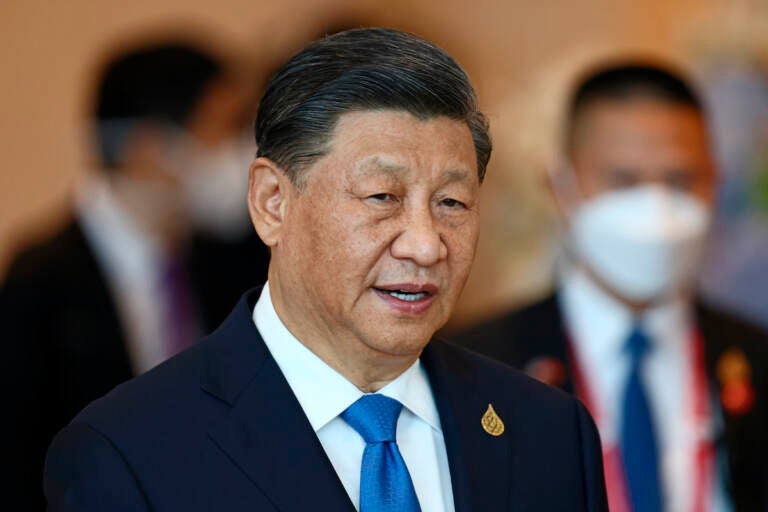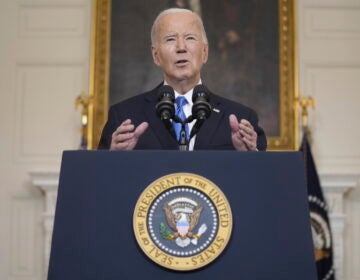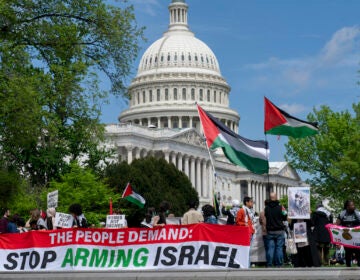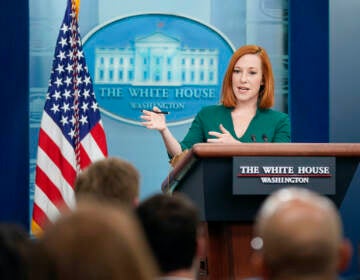China, Ukraine leaders speak for first time since war began
In the call that lasted nearly an hour, Beijing said it wanted to send an envoy to Kyiv to serve as a mediator to pursue a “political settlement.”

China's President Xi Jinping arrives to attend the APEC Economic Leaders Meeting during the Asia-Pacific Economic Cooperation, APEC summit, Nov. 19, 2022, in Bangkok, Thailand. Chinese leader Xi talked Wednesday, April 26, 2023, with Ukrainian President Volodymyr Zelenskyy by phone and appealed for negotiations in Russia's war against his country, warning “there is no winner in a nuclear war,” state media said, in a long-anticipated conversation after Beijing said it wanted to act as peace mediator. (Jack Taylor/Pool Photo via AP, File)
Ukrainian President Volodymyr Zelenskyy said he and Chinese leader Xi Jinping had a “long and meaningful” phone call Wednesday, their first known contact since Russia invaded Ukraine more than a year ago, and Beijing said it wanted to send an envoy to Kyiv to serve as a mediator to pursue a “political settlement.”
The nearly hour-long call came two months after Beijing, which has long been aligned with Russia, said it wanted to act as a mediator and a month after Xi visited Moscow. The timing was also relevant because it comes as Ukraine is readying its forces for an expected spring counteroffensive.
Zelenskyy was upbeat about the call, which offered him the chance to press his views in what until then had been a bilateral dialogue between Moscow and Beijing. Russian President Vladimir Putin is eager to keep Xi close as a counterweight to the United States, which has sided with Ukraine.
“I believe that this call, as well as the appointment of Ukraine’s ambassador to China, will give a powerful impetus to the development of our bilateral relations,” Zelenskyy said in a Facebook post without elaborating.
An official readout on his website called the conversation “productive” and said it leads the way toward “possible interaction with the aim of establishing a just and sustainable peace for Ukraine.”
Zelenskyy emphasized the need to regain all Ukrainian territory and stated, “There can be no peace at the expense of territorial compromises.” In an indirect reference to U.S. reports that China had considered supplying weapons to Russia for its invasion, Zelenskyy’s office said he asked countries to refrain from doing so because “any support — even partial — is converted by Russia into the continuation of its aggression, into its further rejection of peace.”
A Chinese Foreign Ministry statement said Beijing’s “core stance is to facilitate talks for peace,” announcing that an envoy — a former ambassador to Russia — would visit Ukraine to seek a “political settlement.”
The statement struck a positive tone, giving a nod to Kyiv’s insistence that its territory cannot be broken up by Russia’s annexations and making clear that Beijing values its longstanding ties with Ukraine.
“Mutual respect for sovereignty and territorial integrity is the political foundation of China-Ukraine relations,” the statement said. “China’s readiness to develop relations with Ukraine is consistent and clear-cut. No matter how the international situation evolves, China will work with Ukraine to advance mutually beneficial cooperation.”
Analysts expressed skepticism about the prospects for peace.
The call balances China’s dialogue with Russia by showing it is “recognizing Ukraine’s leadership and indicating Ukraine is an important entity,” said Kimberly Marten, professor of political science at Barnard-Columbia University in New York, in an interview with The Associated Press.
But, she added, unless undisclosed details reveal otherwise, “it’s a non-starter. It’s pro-Russian. I would not guess that this holds a lot of significance for ending the war.”
She noted the Chinese proposal didn’t call for Russia to leave occupied areas or brand Russia as an aggressor, and refers to the situation as “a crisis, rather than a war.”
Elizabeth Wishnick, of the U.S.-based think tank CNA and Columbia University’s Weatherhead East Asian Institute, noted in an email to AP that the Chinese statement about the call contains “no mention of a Russian troop withdrawal, which, to my mind, makes this a less than serious initiative and unlikely to contribute in any major way to ending the war, which will likely be decided on the battlefield.”
In Moscow, Russian Foreign Ministry spokesperson Maria Zakharova commended China’s approach, praising Beijing’s “readiness to strive to establish a (peace) negotiations process,” while slamming what she called Kyiv’s “rejection of any sound initiatives aimed at a settlement.”
The White House described it as a positive development, allowing Xi to hear Ukraine’s view of the “illegal, unprovoked invasion.”
“We think that’s a good thing,” White House National Security Council spokesman John Kirby said.
Talks between the two leaders had been anticipated for weeks, after China produced a 12-point proposal to end the fighting, although it did not contain specific proposals. While the West has said China planned to provide weapons to Russia to help fight the war, Beijing has denied it.
Russia and Ukraine are far apart in their terms for peace. The Kremlin wants Kyiv to acknowledge Russia’s annexation of the Crimean Peninsula and the Ukrainian provinces of Donetsk, Kherson, Luhansk and Zaporizhzhia, which most nations have denounced as illegal. Ukraine has rejected the demands and ruled out any talks with Russia until its troops pull back from all occupied territories.
Zelenskyy said in an interview with the AP last month that he hadn’t spoken with Xi since the war began and extended an invitation for him to visit Ukraine.
China has announced it was keen to act as mediator in the war that has reenergized NATO.
With the step, Xi’s government reinforced China’s claim to being neutral in the war, despite blocking efforts at the United Nations to condemn the Kremlin’s invasion.
While Zelenskyy has moved his country closer to NATO and has successfully pleaded with alliance members to send Ukraine sophisticated weapons to help defeat Russia, Beijing has accused the West of provoking the conflict and “fanning the flames” by providing Kyiv with defensive arms.
When China called in February for a cease-fire and peace talks between Ukraine and Russia, Zelenskyy cautiously welcomed Beijing’s involvement. But he said success would depend on actions, not words.
Putin warmly welcomed Xi to the Kremlin, in what was seen as a powerful message to Western leaders that their efforts to isolate Moscow over the fighting in Ukraine have fallen short.
Also on Wednesday, Zelenskyy used the 37th anniversary of the world’s worst nuclear disaster at Chernobyl to repeat his warnings about the potential threat of a new atomic catastrophe in Ukraine during his country’s war with Russia.
Zelenskyy drew a parallel between the Chernobyl accident on April 26, 1986, to Moscow’s brief seizure of that plant and its radiation-contaminated exclusion zone following its full-scale invasion of Ukraine.
“Last year, the occupier not only seized the (Chernobyl) nuclear power plant, but also endangered the entire world again,” Zelenskyy said in a Telegram post in English.
Russian forces were stationed at the closed plant between February and March last year before it was recaptured by Ukrainian troops.
Zelenskyy said Kyiv has since then reestablished prewar security measures and scientific activities within the zone. But he cautioned that future moves from Moscow could endanger global nuclear safety.
“Ukraine and the world have paid a high price for the liquidation of the consequences of the (Chernobyl) disaster,” he said.
Zelenskyy’s office published photos of him laying flowers at two Kyiv memorials to Chernobyl victims and observing a minute’s silence.
More than 150 members of the Ukrainian National Guard captured during Russia’s occupation of the Chernobyl exclusion zone remain in Russian custody, Ukraine’s environment minister said.
Russian forces have also been stationed at southern Ukraine’s Zaporizhzhia Nuclear Power Plant, Europe’s largest and one of the 10 biggest in the world, since capturing the site early in the war.
Ukrainian officials have repeatedly accused Russia of using the plant as a base for firing on nearby Ukrainian-held territory. On Tuesday, Ukrainian officials reported that heavy Russian artillery fire hit cities on the western bank of the Dnieper River just across from the plant.
The plant has six reactors, all of which have been shut down over the past year.
“We must do everything to give no chance to the terrorist state to use nuclear power facilities to blackmail Ukraine and the entire world,” Zelenskyy said in his Telegram post.
WHYY is your source for fact-based, in-depth journalism and information. As a nonprofit organization, we rely on financial support from readers like you. Please give today.






